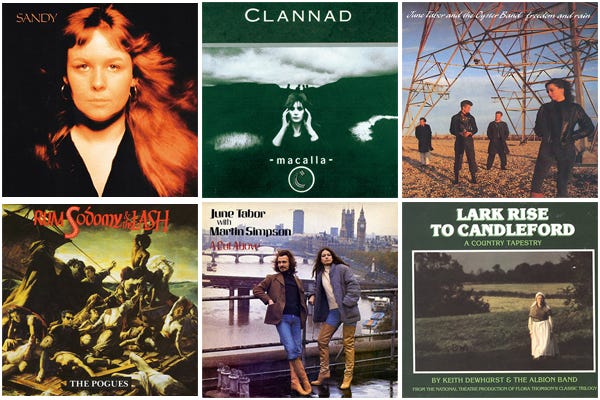New on Shfl, March 2024
Joshua Levine on Emo, Harold Heath on Blue Note’s jazz-funk era, Rich Anderson on British Isles Folk-Rock, plus new recs from Harold Heath, Jon Dale, Megan Iacobini de Fazio, and Joshua Levine
Joshua Levine on Emo
Its influence was ubiquitous to a degree that would likely shock its early adopters, and in many ways its hardcore origins have become so distant as to be irrelevant. Emo began as hardcore with shades of grey, but has become more of an aesthetic than a musical genre, like punk or goth – a general attitude of self-absorption flexible enough to adapt to evolving musical trends.
Collections
Harold Heath on Blue Note’s jazz-funk era
Like soul jazz before it, the emergent jazz funk sound was influenced by the soul and R’nB of the day, and the Mizell brothers’ Blue Note productions were key in fusing sleek, sophisticated contemporaneous soul and funk with jazz, finessing a fusion that would go on to be hugely commercially successful. This musical offspring was the jazz-funk genre, and the Blue Note albums from this period by artists like Donald Byrd, Lou Donaldson and Gene Harris provide a musically rich, expertly played, innovative, progressive and above all, funky audio history of its genesis.
Rich Anderson on British Isles Folk-Rock
In England, rock and roll took root and flourished in the 1960s, eventually coming back to the US in a slightly altered but still fundamentally rockish form; at the same time, traditional musicians from across the British Isles (notably including Ireland and Scotland) created a blend of folk and rock music that sounded like nothing Americans had heard – it certainly differed very starkly from both the country-derived psychedelic pop sounds of the Byrds and the Flying Burrito Brothers and the wispier, acoustic singer-songwriter stylings of folk popsters like Joni Mitchell and James Taylor.
Reviews
Harold Heath
The Counts — What’s Up Front That Counts
In the vast crowd of rediscovered seventies funk, this 1971 album on the legendary Westbound Records from Detroit six-piece funk outfit The Counts stands head and shoulders above many of its peers and is an outstanding example of early 70s street funk very much deserving of its remastering and rerelease.
Brittany Howard — Jaime
Stay High’s aesthetic references old soul music — Howard digs out classic soul musical motifs like plucked orchestral strings and what sound like the prettiest little Jackson 5-ish xylophone melodies — and stitches them onto raw, lo-fi hip hop beats, with the seams and rough edges left unfinished.
Scrimshire — Music for Autumn Lovers
For this, his tenth album, he’s dropped the tempo and most of the danceability, focusing instead on gentle moods and sonic textures redolent of Autumn. Music For… actually originated back in 2021 from an attempt to make a piece of music a day, in an hour, the results of which became an EP, tracks from which now make up part of this album.
Megan Iacobini de Fazio
Tarta Relena — És Pregunta
Singing in Catalan, Italian, Greek, Latin, English, and even Ladino, Tarta Relena treat language almost as an instrument, shaping their soundscapes and infusing their songs with vivid, evocative imagery.
Jamaica Mnanda — Maisha Ya Mtaani
Maisha Ya Mtaani is an explosive, chaotic debut that immerses you in the raw, percussive energy of Dar es Salaam’s streets. The music is a captivating whirlwind of distorted synths, rhythmic chants, and urgent vocals which captures the mchiriku sound, a style born from the 1990s DIY scene, where distorted Casio keyboards and hand drums redefined urban soundscapes in Tanzania.
Collignon — Bicicleta
Bicicleta moves with the freedom its title suggests, a journey powered by groove, melody, and instinct, moving fluidly between raw dub textures and vintage psychedelic warmth.
Jon Dale
Television Personalities — Mummy You’re Not Watching Me
If the intelligence of early Television Personalities songs were shielded by both DIY production and punk scene reportage, by Mummy You’re Not Watching Me TVPs leader Dan Treacy had started to find ways to fold newly deeply emotional songwriting into his group’s curious mergers of psychedelia, mod, sixties pop, and post-punk.
Souled American — Notes Campfire
It’s quite some achievement to start out wanting to merge reggae and country, and then somehow to end up with an album as self-contained and deconstructed as Notes Campfire, but the thing with Souled American is, all of their moves have always felt completely unforced: this is just how the music goes.
Steve Kilbey — Unearthed
It’s not as though The Church didn’t grant Steve Kilbey enough creative opportunities – their run of albums across the eighties are breathlessly brilliant, and rich with psychedelic pop gems – but there is certainly something curious about hearing Kilbey on his lonesome, giving fullest expression to indulgent whims.
Joshua Levine
Ike & Tina Turner — Come Together
Come Together was in the middle of a series of albums by Ike and Tina Turner that marked their transition from 1960s soul chameleons to 1970s grimy rock and rollers.
The Afghan Whigs — Black Love
Out of all the bands from the US indie rock underground that gained visibility due to the success of Nirvana and grunge in the early 1990s, The Afghan Whigs were virtually unique in their incorporation of Black soul music, often using wah-wah guitar lines or syncopated beats to temper and diversify their dense and claustrophobic rock and roll psychodramas. On Black Love the Ohio quartet fully embraced the form rather than just its signifiers.
Richard Hell & the Voidoids — Blank Generation
Unlike his peers and contemporaries, Patti Smith and Tom Verlaine, Richard Hell wanted to recreate the conditions that led to the caustic romanticism of his literary heroes Rimbaud and Baudelaire. And so his creative process was inextricably linked to his wasted street urchin lifestyle – Hell seemed to have zero interest in the dependable and predictable professionalism necessary for music biz success.








